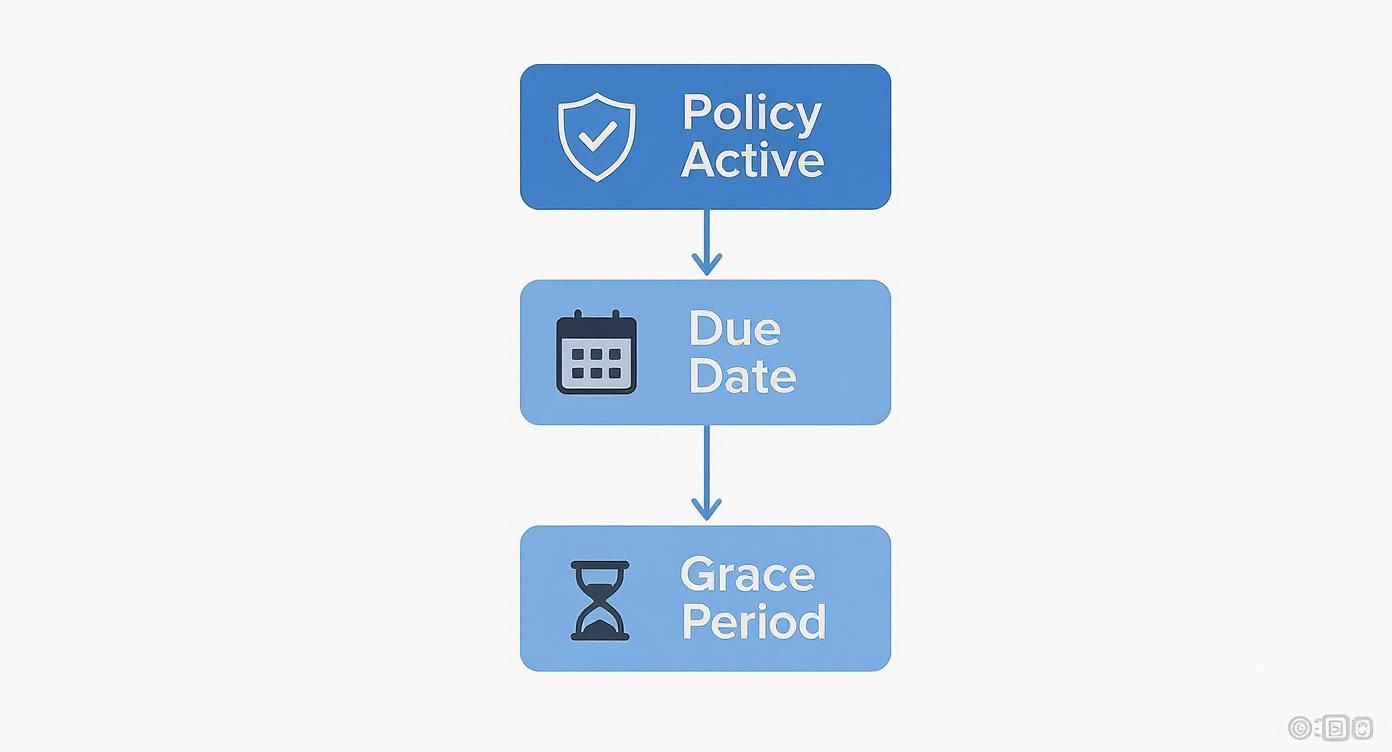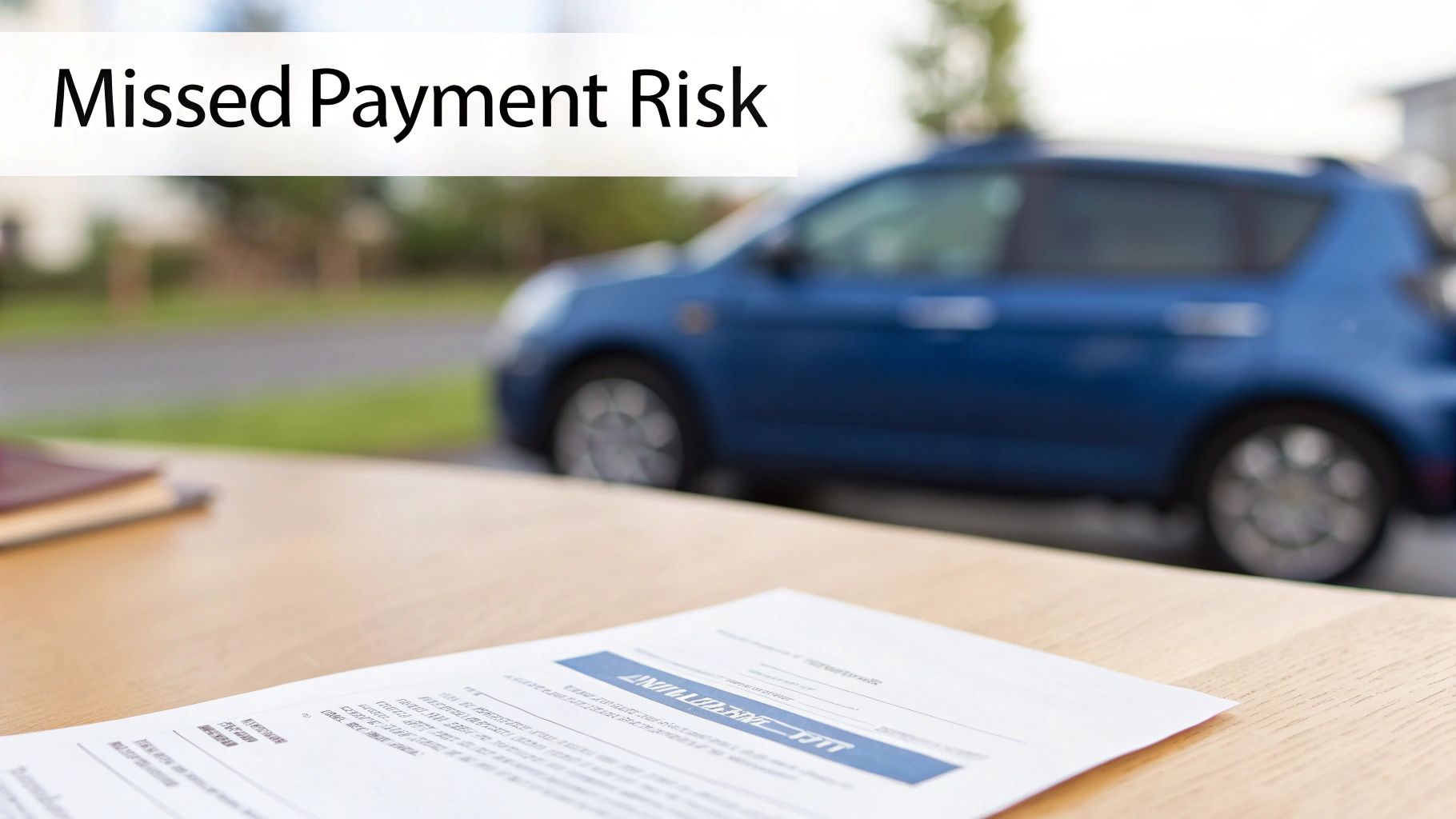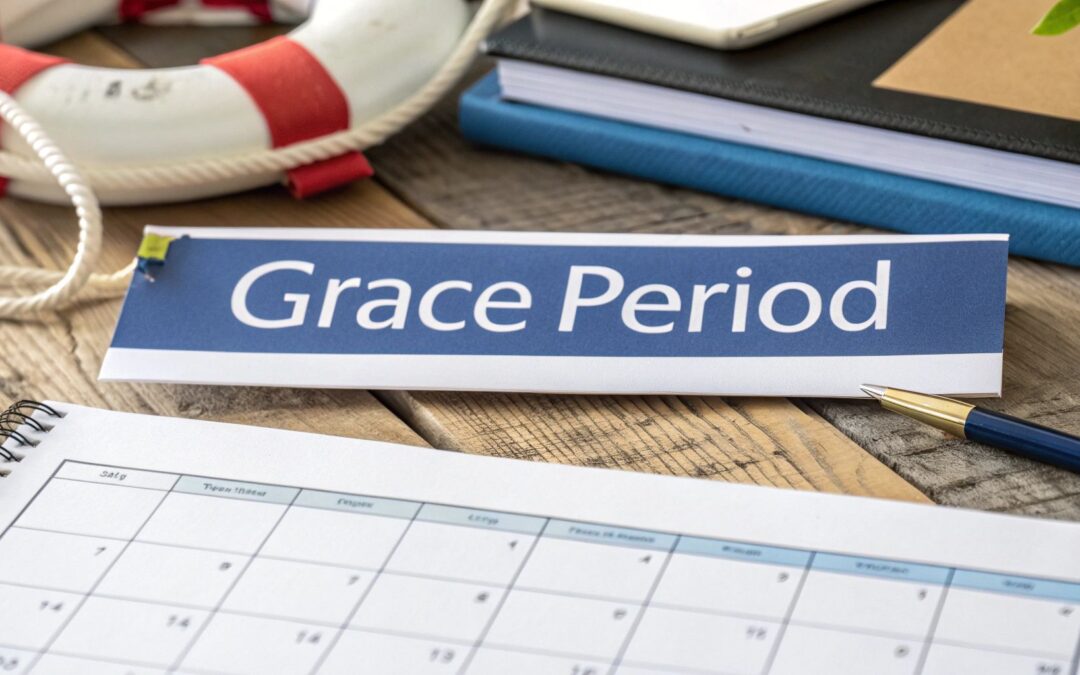Life happens. We’ve all been there—a bill gets misplaced, a due date slips our minds, or money is just a little tight one month. When it comes to your insurance, a small mistake like a late payment could leave you dangerously unprotected.
That's where the grace period comes in. Think of it as your financial safety net. 🛡️
It’s a specific window of time after your premium is due where you can still make a payment without your policy getting canceled. This buffer is designed to give you a second chance, keeping your coverage active even when you’re a few days behind.
Your Financial Safety Net During a Missed Payment
The insurance grace period is a crucial feature built right into your policy. It’s that pre-defined amount of time, clearly spelled out in your documents, that stands between a simple missed payment and a catastrophic loss of coverage.
Without it, one late payment could mean your health, auto, or life insurance is instantly terminated. Imagine getting into an accident the day after you forgot to pay your car insurance premium. The grace period is what prevents that nightmare scenario, giving you the flexibility you need for those "life happens" moments.
To learn more about how the payments themselves work, check out our simple guide on what is an insurance premium.
How Long Is a Typical Grace Period?
So, how much extra time do you actually get? Well, it depends. There's no one-size-fits-all answer, as the length of the grace period varies based on the type of insurance you have and your state's laws.
- Short-Term Policies: Insurance for things like travel or specific events might have a very short grace period, sometimes only a few days.
- Long-Term Policies: Core policies like life or health insurance usually offer a more generous window to catch up.
Generally, you can expect a grace period to last anywhere from 24 hours to 30 days. This ensures that even with a late payment, your protection stays in place. Keep in mind, though, that some insurers might charge a small late fee.
To make it even clearer, here’s a quick breakdown of what a grace period is all about.
Insurance Grace Period At a Glance
| Aspect | Brief Explanation |
|---|---|
| What It Is | A set period after a premium's due date to pay without losing coverage. |
| Main Purpose | To prevent immediate policy cancellation due to a minor payment delay. |
| Typical Length | Varies by policy and state, but often ranges from 24 hours to 30 days. |
| Key Benefit | Ensures continuous protection and offers flexibility to the policyholder. |
| Potential Cost | Some insurers may apply a late fee, even if you pay within the grace period. |
Ultimately, the grace period is your policy's way of saying, "We get it, things come up." It’s an essential feature that provides peace of mind and keeps you covered when you need it most.
How Grace Periods Vary Across Different Policies
Not all grace periods are created equal. Think of it this way: the safety net you have for your health insurance might be a world away from the one for your car. Assuming they're the same is a common mistake, and it can lead to some seriously expensive gaps in your coverage.
There’s no single, standardized grace period that applies to every policy out there. The rules are a mix of what your insurance company decides and what your state laws require.
For example, life insurance policies almost always have a legally required grace period, usually 30 or 31 days. This is a critical protection built in to prevent a policy from lapsing just because of a small oversight. But with auto insurance? Those grace periods can be much shorter and vary wildly, sometimes only giving you a few days before your policy is cancelled.
A Look at Health Insurance Rules
Health insurance is where you’ll find some of the most specific—and generous—rules, especially if you bought your plan through the Affordable Care Act (ACA) marketplace.
For anyone getting a premium tax credit, the ACA actually mandates a 90-day grace period. During the first month, your insurer has to keep paying claims. For the second and third months, they can hold off on paying claims until you catch up on what you owe.
This gives a pretty substantial buffer to people who rely on subsidies, protecting them from losing their health coverage right away. This visual gives a great breakdown of how the grace period works in relation to your due date.

As you can see, the grace period isn’t just extra time—it’s a crucial buffer that only kicks in after your payment is officially late.
Home, Auto, and Other Policies
When it comes to home and auto insurance, things get a bit murkier. Grace periods are much less standardized and depend heavily on state laws and your specific insurer's policies. Plus, if you have a mortgage or car loan, your lender will demand continuous coverage, which adds pressure to get any payment issues sorted out fast.
For a deeper dive into how these rules apply in other specific situations, a guide on long term disability insurance can offer some valuable parallels.
But here’s the bottom line: never, ever assume. Your policy document is your best friend. Read it, understand it, and know exactly how much time you have before you’re at risk of losing coverage.
Understanding the Rules and Regulations
A grace period isn't just a nice-to-have courtesy from your insurance company. More often than not, it's a legal requirement designed to protect you from losing coverage over a minor, temporary hiccup. Life happens, and these rules ensure one late payment doesn't leave you completely exposed.
These regulations create a mandatory safety net, but the specifics can change depending on your state and the type of insurance you have. Still, the goal is always the same: to give you a fair chance to catch up before your policy is canceled. This legal backbone is a huge part of overall insurance industry regulatory compliance.
The ACA’s 90-Day Grace Period: A Closer Look
One of the best real-world examples of this protection in action is the 90-day grace period built into the U.S. Affordable Care Act (ACA). This rule applies specifically to people who get premium tax credits to help pay for their health insurance through an exchange. It's a powerful consumer safeguard.
But here’s where it gets interesting—how claims are handled during these three months isn't straightforward. The ACA created a tiered system to balance your needs with the insurer's.
Here’s how it works:
- Month 1 (Days 1-30): If you submit a claim during the first 30 days of the grace period, your insurer is required by law to pay for it. No questions asked.
- Months 2 & 3 (Days 31-90): For the next 60 days, your insurer can "pend" or suspend your claims. This means they’ll hold off on paying your doctor or hospital until your outstanding premiums are paid in full.
This setup makes sure you don't lose your plan immediately while also making sure insurers get paid for the coverage they provide.
The ACA’s 90-day rule for subsidized members is a game-changer. It means your coverage is safe for three months after a missed payment, but with a catch: claims are only guaranteed to be paid in the first month. For the next two, payments are paused until you're caught up. You can dig deeper into these specific ACA grace period regulations on ccf.georgetown.edu.
If you don't settle your balance by the end of the 90 days, the insurance company can officially terminate your policy. What’s more, they can go back to the doctors and hospitals and take back any money they paid for claims during the second and third months, which could leave you holding the bill.
What Happens When You Miss a Premium Payment

It’s a heart-sinking moment: you realize you’ve missed an insurance payment. We've all been there. But don't panic—your coverage doesn’t just vanish overnight.
The moment your due date passes, your policy enters a grace period. This is your safety net. During this window, your coverage is still active, protecting you just as it did before.
This means if you have an accident a day after your payment was due, you’re still covered. The missed payment doesn't get forgotten, but you’re not left out in the cold.
Filing a Claim During the Grace Period
Let’s make this real. Imagine your car insurance payment was due yesterday, and today you get into a minor fender bender. Your insurance company will still process your claim.
Here’s the catch: they will almost certainly deduct the overdue premium right from your claim payout. So, if the claim is for $2,000 and your missed premium was $150, you’ll get a check for $1,850. It's a fair system that ensures you get the protection you've been paying for, while the insurer gets the payment they're owed.
A word of caution: while the grace period is a lifesaver, don't make a habit of it. Insurers see consistent late payments as a red flag. It can signal risk, which might lead to higher premiums when it’s time to renew.
When the Grace Period Runs Out
The real trouble starts when the grace period ends and you still haven't paid. At that point, your policy will lapse—another word for being terminated.
The consequences are serious and can ripple through your financial life for a long time.
- You Lose Your Coverage: You’re now completely uninsured. Any accident or incident is your financial responsibility, a risk no one should take.
- You Have to Start Over: Getting new coverage isn't as simple as just paying up. You'll likely need to go through the entire application process again.
- You'll Pay More: A policy lapse can label you as a high-risk client. When you reapply, you can almost always expect to see more expensive rates.
- Your Claims Could Be Denied: It's critical to know your rights, especially if a lapse leads to claim issues. You may need to learn how to fight back if your car insurance claim is denied in these complicated situations.
Letting your policy lapse is more than just an inconvenience; it's a costly mistake. If you’re worried about falling behind, it's worth understanding exactly what happens if I stop paying my life insurance to see the long-term impact.
Why Grace Periods Matter (Hint: It’s Not Just About You)
A grace period feels like a lifeline when you need it, but it’s more than just a convenient buffer for you. It’s actually a brilliant feature that balances your needs as a customer with the practical realities of the insurance business. It’s a win-win built on a simple foundation: life happens.
For you, it’s a safety net. An unexpected car repair, a bill that gets lost in the mail, or just a moment of forgetfulness could lead to a massive headache—a sudden loss of coverage. A grace period turns that potential disaster into a minor hiccup, giving you a chance to catch up without leaving yourself unprotected.
For the insurance company, this flexibility is just smart business. Think about it: finding a brand-new customer costs way more than keeping a loyal one. By offering a grace period, insurers avoid canceling policies over small, temporary issues. This keeps their customer base stable and their business healthy.
A Tool for Loyalty and a Lifeline for You
You can think of a grace period as a bridge built on trust. The insurer extends a temporary safety net, and in return, you’re more likely to stick around for the long haul. It’s a system that acknowledges that things don’t always go according to plan.
And this isn’t just a theory—people rely on this feature. A study of health insurance data from Washington State revealed that of all the people who entered a grace period, a whopping 62% paid their premium and kept their coverage. This shows the system works exactly as it should. It's an essential safeguard, not a loophole. You can learn more about how grace periods support policy retention at cbpp.org.
A grace period is a two-way street. It gives you breathing room during a tough month while helping insurers prevent customer turnover and the high costs of finding new ones.
At the end of the day, this simple idea serves both sides. It gives you peace of mind and protects the insurer's bottom line, making the entire insurance system a little more human and a lot more resilient.
Best Practices for Managing Your Insurance Payments

While an insurance grace period is a crucial safety net, the best strategy is simple: never need it. Staying on top of your premium payments means your coverage is always secure, with zero risk of a lapse. The trick is to be proactive, not reactive.
A few simple habits can make all the difference. Setting up automatic payments is easily the most foolproof way to get your premiums paid on time, every single time. If you’d rather keep manual control, calendar alerts on your phone can be a lifesaver, reminding you a few days before the due date.
Proactive Payment Management Tips
Ready to get ahead of the game? Try putting these simple but powerful strategies into practice:
- Set Up Autopay: This is the “set it and forget it” method. Just link your bank account or credit card, and your premiums are automatically deducted. No more forgetting.
- Create Digital Reminders: Use your phone’s calendar or a reminder app. Set one alert for a week before your payment is due, and another for the day before.
- Know Your Billing Cycle: Be crystal clear on when your payment is due each month or quarter. If you're a visual person, mark it on a physical calendar.
What to Do If You Know You'll Be Late
Life happens. Sometimes, even with the best intentions, you know a payment is going to be late. In that moment, communication is your most powerful tool.
Pick up the phone and call your insurer before the due date. Many companies are willing to discuss a temporary payment plan or offer some guidance. Taking that step shows you’re responsible and can prevent a lot of headaches down the road.
If you don't pay by the end of the grace period, insurers can retroactively cancel your policy. This could leave you on the hook for any claims that happened during that time. Being proactive is always the smarter—and safer—financial choice. And if cost is the issue, it might be time to look into how to reduce insurance premiums to find a plan that better fits your budget.
Common Questions About Insurance Grace Periods
Even when you know what a grace period is, a few real-world questions usually pop up. Let's clear up some of the most common ones so you feel completely confident about how this safety net actually works.
Will Using the Grace Period Hurt My Credit Score?
No, simply using the grace period won't directly ding your credit score. Insurance companies don’t report routine late payments to the big credit bureaus.
But here’s the catch: if your policy eventually gets canceled because you never paid, that’s a different story. If the insurer turns over your outstanding balance to a collection agency, that can show up on your credit report and drag your score down.
Is My Coverage Actually Active During the Grace Period?
Yes, absolutely. Your insurance coverage is 100% active throughout the entire grace period. You’re just as protected as if you had paid the premium on the dot.
Think of it this way: if you have a claim during that window, your insurer is still on the hook to process it. The only difference is they will almost certainly deduct the premium you owe from whatever payout you receive. It’s a fair system that makes sure you get the protection you paid for.
Can an Insurer Cancel My Policy Without Offering a Grace Period?
This is where things can get a little tricky, and it really comes down to your specific policy and state laws.
Many types of insurance are legally required to include a grace period—especially life insurance and health plans from the ACA Marketplace. However, it’s not a universal rule for every single policy out there.
The best thing you can do is read your policy documents or just call your insurer. Never assume a grace period exists. Always confirm the rules for late payments so you’re not caught off guard by a sudden loss of coverage.
Navigating insurance policies can be confusing, but you don't have to do it alone. The team at My Policy Quote is here to help you find clear, affordable coverage that fits your life. Get your free, no-obligation quote today!


